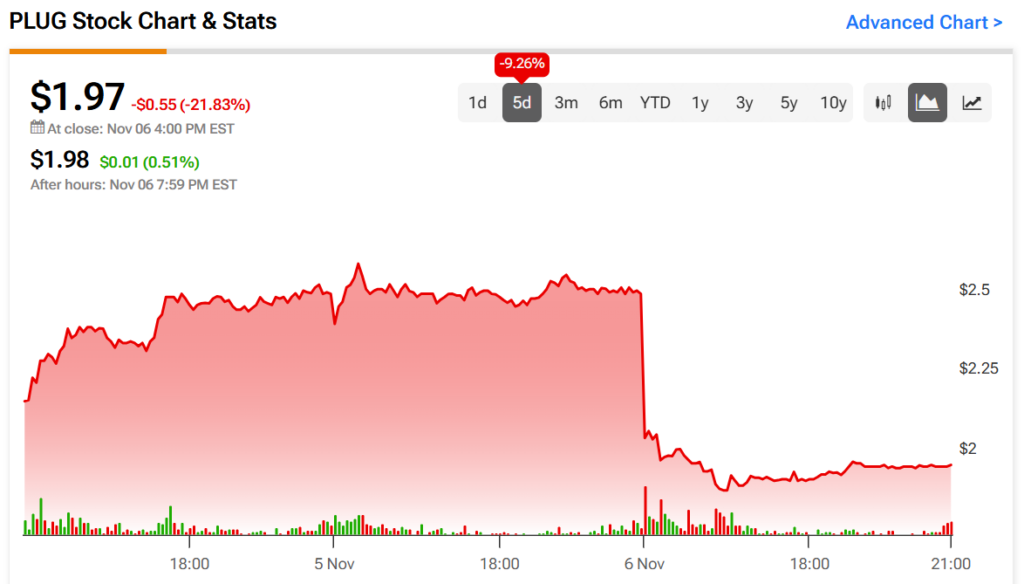With the possible rollback of green energy tax credits and the imposition of tariffs on imports, a cloud of uncertainty hangs over the future of Plug Power (PLUG) following the recent election. Investors’ fears of potential policy shifts in the Trump administration, ending federal support for renewable energy helped drive the shares down over 21% in the past day. The company relies heavily on federal backing and its international supply chain to make hydrogen fuel cells affordable for industries seeking clean energy alternatives.
Discover the Best Stocks and Maximize Your Portfolio:
- See what stocks are receiving strong buy ratings from top-rated analysts.
- Filter, analyze, and streamline your search for investment opportunities with TipRanks’ Stock Screener.
However, despite these potential challenges, Plug Power remains committed to its mission of decarbonizing the economy, with ambitious plans to build and operate a green hydrogen highway across North America and Europe, and has recently signed a significant agreement with Allied Green Ammonia to provide three gigawatts of electrolyzer capacity to AGA’s green hydrogen to ammonia plant in Australia.

Plug’s Path Forward
Plug is actively constructing a comprehensive green hydrogen system that encompasses production, storage, delivery, and energy generation. It intends to support its clients’ business targets and reduce carbon emissions. The company leads the market with over 69,000 fuel cell systems and 250+ refueling stations globally. It is also the world’s top consumer of liquid hydrogen.
Plug is setting up a green hydrogen highway across North America and Europe as part of its ambitious plans. It has built a Gigafactory for electrolyzer and fuel cell production and plans to establish multiple green hydrogen production plants by the end of 2028. Plug provides its green hydrogen solutions directly to customers and joint venture partners for use in various sectors, including material handling, e-mobility, power generation, and industrial applications.
Plug was awarded a $10 million grant from the U.S. Department of Energy (DOE) to demonstrate a next-generation hydrogen refueling infrastructure for medium- and heavy-duty vehicles. The company had also been chosen for nine DOE awards under the Bipartisan Infrastructure Law for its Clean Hydrogen Electrolysis, Manufacturing, and Recycling Activities efforts. Without such support, the company’s green highway may be at risk.
However, one potential path forward for the company is the recently entered agreement with Australian company Allied Green Ammonia. The agreement provides for the supply of three gigawatts (GW) of electrolyzer capacity to AGA’s green hydrogen to an ammonia plant in Australia. This partnership is crucial to establishing one of the world’s largest green ammonia production facilities. Plug Power’s electrolyzer system is set to be delivered by the end of 2026 or the beginning of 2027.
AGA is presently developing a substantial green ammonia production facility, planned to produce around 2,700 metric tons daily, leveraging renewable energy resources with a solid energy infrastructure. This facility is strategically located at Gove Peninsula in Northern Territory, Australia, and it aims to meet the escalating demand from AGA’s customers in Asia and Europe. The collaboration intends to significantly reduce carbon footprints in ammonia production by replacing traditional methods with Plug’s advanced electrolyzers.
AGA’s industry expertise combined with this technology will enable them to produce green hydrogen and ammonia competitively, unlike conventional carbon-intensive methods.
Is PLUG Stock a Buy?
The recent drop in share price has punctuated a downward trend, as the stock has declined 56% year-to-date. It trades near the low end of its 52-week price range of $1.60 – $6.33, with the post-election drop driving it below the 20-day (2.18) and 50-day (2.16) moving averages.
Analysts following the company have mixed views on PLUG stock. Based on 17 analysts’ aggregate recommendations, Plug Power is rated a Hold overall. The average price target for PLUG stock is $3.97, representing a potential upside of 101.52% from current levels.

Bottom Line on PLUG
Despite policy uncertainties and potential challenges, Plug Power is actively constructing a comprehensive green hydrogen system across North America and Europe and targeting multiple green hydrogen production plants by 2028. Its crucial partnership with Allied Green Ammonia in Australia demonstrates a potential path forward for the company to supplement the federal support it may be losing under a new administration. While the company’s ambitions make for a compelling case for its future potential, given the current uncertainty in future policy, investors may want to stay on the sidelines.









